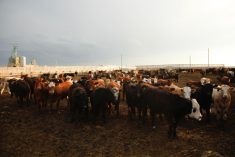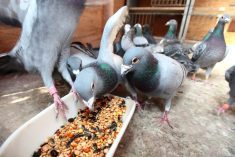UPDATED, April 17 — Cases of COVID-19 have now been confirmed at three of Alberta’s major beef packing plants.
Three cases of COVID-19 were confirmed Wednesday at the JBS beef packing plant in Brooks, said Tom Hesse, Local 401 president with United Food and Commercial Workers (UFCW) Canada.
JBS Canada spokesman Cameron Bruett confirmed some employees have tested positive for the virus, but said the Brooks plant is staying open.
“We are providing support to those team members and their families, and we hope they all make a full and speedy recovery. Out of respect for the families, we are not releasing further information,” he wrote in an emailed statement.
Read Also

Trump tariff on Brazilian goods could jack up U.S. burger price
U.S. President Donald Trump’s plan for a 50 per cent tariff on goods from Brazil will likely raise prices for the beef that is used in American hamburgers, traders and analysts said on Thursday, as food manufacturers increasingly rely on imports during a time of declining domestic production.
“The food supply is a critical infrastructure industry and we have a special responsibility to maintain operations on behalf of the country. We take this responsibility seriously.”
On Easter weekend, it was reported that 38 cases of COVID-19 were diagnosed at the Cargill plant in High River, and one case was detected at Harmony Beef back in March.
The number of cases at Cargill prompted Alberta Health Services to open a dedicated testing centre at that plant this week, Alberta’s chief medical officer of health said Wednesday.
“Local public health has worked with these locations to ensure close contacts are isolated and prevent transmission,” Dr. Deena Hinshaw said. “There is no risk to the public from food produced in these plants.”
Hesse said he has written a letter to Cargill urging the company to shut down its High River plant.
“When you have that measure of diagnoses, you shut the plant down, just for two weeks,” Hesse said Tuesday. “It’s a necessary act to save lives and keep the plant functioning. If food inspectors think it’s unsafe, they won’t come to work, and they (Cargill) will have to shut the plant down. If COVID gets worse they will have to shut the plant down.”
‘Business resumption protocol’
Jon Nash, the North America lead for Cargill’s protein division, told Glacier FarmMedia on Monday in an emailed statement that the second shift at the High River plant would be temporarily idled starting that day.
The facility has also put additional safety measures such as temperature testing and distancing practices “where possible,” he said.
The plant is working with Alberta Health Services, the Canadian Food Inspection Agency (CFIA) and safety officials, and will consider a shutdown if necessary, Nash told other media this week.
The Alberta and federal governments said Thursday they’ve now agreed on an “intergovernmental business resumption protocol” when responding to confirmed COVID-19 cases in provincially and federally licensed food processing facilities, which would allow plants to continue operating.
Whereas the COVID-19 case last month at Harmony Beef had led to a shutdown at that plant, the principles of the new protocol were applied when the Cargill plant booked its first confirmed case of COVID-19 on April 6, the province said Thursday in a release.
“We are proud of the fact that this protocol has already proven effective in advance of it being formally signed by all parties,” the province said.
The new protocol “complements the guidance that the CFIA has provided to federally registered meat establishments to implement measures to reduce the risk of COVID-19 exposure for inspectors and workers,” federal Agriculture Minister Marie-Claude Bibeau said in the same release.
Cargill did not respond to interview requests from Alberta Farmer.
— Alexis Kienlen reports for Alberta Farmer from Edmonton. Includes files from Glacier FarmMedia Network staff.
Update, April 17: A previous version of this article incorrectly stated CCA executive vice-president Dennis Laycraft had toured the Cargill plant since the outbreak occurred.


















